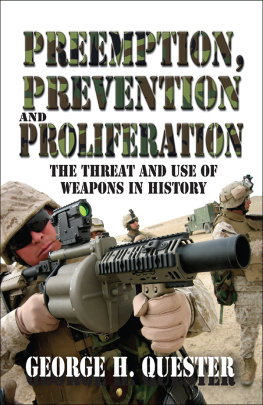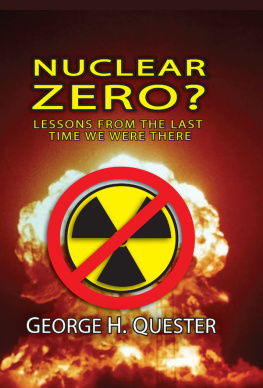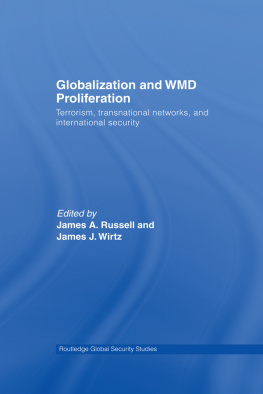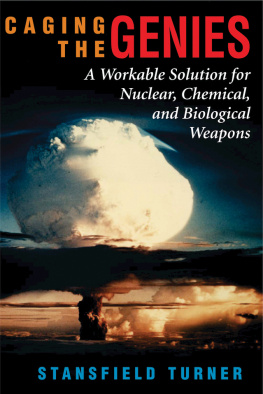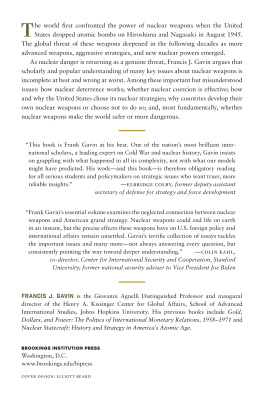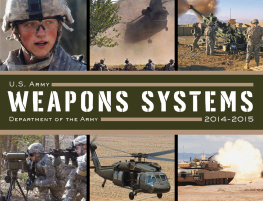PREEMPTION,
PREVENTION,
AND
PROLIFERATION
First published 2009 by Transaction Publishers
Published 2017 by Routledge
2 Park Square, Milton Park, Abingdon, Oxon OX14 4RN
711 Third Avenue, New York, NY 10017, USA
Routledge is an imprint of the Taylor & Francis Group, an informa business
Copyright 2009 by Taylor & Francis.
All rights reserved. No part of this book may be reprinted or reproduced or utilised in any form or by any electronic, mechanical, or other means, now known or hereafter invented, including photocopying and recording, or in any information storage or retrieval system, without permission in writing from the publishers.
Notice:
Product or corporate names may be trademarks or registered trademarks, and are used only for identification and explanation without intent to infringe.
Library of Congress Catalog Number: 2009022562
Library of Congress Cataloging-in-Publication Data
Quester, George H.
Preemption, prevention, and proliferation : the threat and use of
weapons in history / George H. Quester.
p. cm.
Includes bibliographical references and index.
ISBN 978-1-4128-1041-8 (alk. paper)
1. Weapons--History. 2. Military history. 3. Preemptive attack (Military science)--History. 4. Arms race--History. 5. International relations--History. 6. Military policy--History. 7. International relations. 8. Military policy. I. Title.
U800.Q84 2009
327.174--dc22
2009022562
ISBN 13: 978-1-4128-1041-8 (hbk)
CONTENTS
I must express thanks for help in the writing of this book to the participants and organizers of a long series of seminars and workshops convened, at my behest, on the theme of preemption and preventive war, at various universities and research centers inside and outside the United States. The questions and criticisms voiced in these sessions were extremely valuable. Gil Peleg and Nicholas Grossman were very helpful as graduate research associates, most usefully criticizing my thinking, as well as tracking down arcane materials.
A few portions of the text were published earlier, under the tile Two Hundred Years of Preemption in the autumn, 2007 issue of the Naval War College Review.
The research on the book was facilitated by grants from the Smith Richardson Foundation, and then later from the Office of Net Assessment in the Department of Defense. Neither of these organizations is responsible for the interpretations presented in this book.
Thanks also have to be directed to my wife, Aline Olson Quester, whose energy for her own work never seems to be exhausted, and who has thus prodded me on by her example.
Introduction
This is a book about the practice and mere threats of preemption or preventive war, in particular when states feel the need to head off a proliferation of the most threatening weapons on the part of adversaries.
Setting the stage for this, we might all be reflecting today on the 200th anniversary of what came to be known as Copenhagening. In August of 1807, a British fleet for the second time confronted the Danish government at Copenhagen with an ultimatum that the possibility of the Danish fleet falling under the control of Napoleon could not be tolerated. Just as with the 1801 attack under the command of Admiral Horatio Nelson, the Danes were given the choice of surrendering their fleet to British control, or of doing battle. The Danes resisted in 1807 as in 1801, with the result that the bulk of their fleet was destroyed (along with perhaps 30 percent of the city of Copenhagen itself), but the important result for Britain was that Napoleon was once more precluded from mustering a naval threat. (The British rocket-firing ships and mortar ships that were used in the attack on Copenhagen were to see action again in the 1814 British attack on Baltimore during the War of 1812, in the rockets red glare, the bombs bursting in air. One wonders whether anyone between 2007 and 2014 would now be exploring a special sister-city celebration between Copenhagen and Baltimore.)
As a model from our past, the threat the Royal Navy preempted at Copenhagen was an existential threat to the very safety of Britain itself. If Napoleon or anyone else had ever been able to assemble a naval superiority in the English Channel, the independence and liberties of Englishmen would have been at an end. The memories of these two preemptive attacks on Denmark were then to be enshrined in periodic references for a century thereafter, in Britain and among various of Britains potential adversaries (Germany, France, and even the United States), to the option of another Copenhagening attack, striking first against any challenge to Britains naval supremacy.
The existential threat headed off by a British posture of preemption is all too analogous, of course, to the threat posed since September, 2001 by the possibility of mass-destruction terrorism against the United States homeland. Since such terrorists can not be deterred by the prospect of retaliation, and since defenses against such attacks will always be imperfect, the lives of millions of Americans will be at stake. Whatever the wisdom or folly of the particular American preemptive attack on Iraq, future American presidents will have to be willing to consider striking first to prevent an attack on American cities.
As discussed at length in below, the Bush administration has been criticized for blurring the distinction between preemption and preventive war. There are many ways to draw this distinction, but our intuition may often settle back to the question of whether war was imminent and inevitable (whereupon we might be less morally critical of the initiative taken, and label it preemption), or whether peace might instead have been an option for a longer time into the future (with a morally condemnable preventive war being initiated simply because the power relationships were being changed). In defense of any leader making such choices, however, it must be noted that worst-case analysis may often make an adversarys attack seem inevitable, once the conditions for such an attack are right, so that our actions to head this off will always seem like preemption.
offers an analysis of how peace has emerged from decade to decade under varying systems of international relations, and of how preventive wars have played a role in such systems. The only such system expressly designed to achieve peace is that of collective security, with other systems basically generating peace as a byproduct. While one normally assumes that collective security includes no role for the initiation of wars, there may indeed be some exceptions to this generalization.
In , we turn to our possibly faulty memory of how often there have been instances or threats of preventive wars in the past. Our count may indeed be too low because we do not want to blemish the memory of democracies by imputing war plans to them, and because we do not want to credit autocrats with being driven by the fears of others attacks. Yet the plans for possible Copenhagening attacks are certainly not the only examples of such thinking in recent history.
notes how the dominant world opinion in 1918, as embodied in Woodrow Wilsons designs for the League of Nations, was to delegitimate anticipatory self-defense and preemption, as being the source of needless outbreaks of war. But an important theme for the more realist Franklin Roosevelt in 1945, as the United Nations was launched in the wake of the Fascist threats in World War II, was that some kinds of advance threat are so ominous that one cannot wait for the actual military attack, that one may instead have to anticipate and preempt such a threat.

